ORGANIC MATTERS
Organic matters a lot to us here at LIV because organic food is guaranteed to come from trusted sources.
|
The Soil Association describe organic food as 'food as it should be' and we agree with them. Organic farming is rigorously governed and independently inspected in a way that no other farming or food production system comes close to. When you buy food with an organic certification you know that it has been produced in a way that benefits people, animals, wildlife, society and the environment. That's pretty impressive. In a world where erroneous health claims abound, it's also pretty important.
We don't claim that 100% of the food we stock is organic. It isn't. We do try to bring you the widest range of organic goods possible. Where it is practical to stock or serve organic food we will and the vast majority of foods in our store carry organic certification. |
ORGANIC ALWAYS MEANS:
- Fewer pesticides
- No artificial colours and preservatives - Free range - No routine use of antibiotics - No GM ingredients |
REASONS TO CHOOSE ORGANIC
AS SET OUT BY THE SOIL ASSOCIATION
|
1. Knowing what's in your food
Soil Association standards ban the routine use of antibiotics and the use of genetically modified (GM) crops or ingredients of any kind. For these reasons and more, the 'organic' badge really can give you confidence that you know what is in the food you eat. Avoiding pesticides and additives is the biggest motivator for choosing organic food. The majority of both can be avoided completely in this way. Lots of pesticides and herbicides are banned in organic food production and many of the additives allowed are ones of natural origin, such as citric acid from lemons. 2. Fewer pesticides
Organic food is produced using virtually no pesticides, versus almost 300 that can legally be routinely used in the farming and production of non-organic food in the UK. These pesticides can pollute our water and the environment. Herbicides are completely banned in organic farming, as are weed killers. In fact, research suggests that if all farming in England and Wales was organic, use of pesticides would drop by 98%. |
3. Better for animals
"What you feed farm animals and how you treat them affects the quality of the food. The hard work organic farmers put into caring for their animals pays off in the quality of the food they produce, giving real value for money.” - Helen Browning, CEO of The Soil Association Lots of the food we serve and sell at LIV is vegan but not all of it. The produce that isn't vegan is organic. That means higher standards of animal welfare than any other method of farming and always free range, amongst other things. 4. Better for wildlife The banning of herbicides and severe restriction of insecticides and fungicides are good news for wildlife. In fact, organic farms are a haven for wildlife, providing homes for birds, bees and butterflies. Plant, bird and insect life is, on average, 50% more abundant on organic farms than non-organic ones. 5. Better for the planet By virtue of being better for for wildlife, amongst other things, organic farming minimises disruption to the natural environment. Generally it releases fewer greenhouse gases and works with the environment, rather than against it. It has significant potential to help tackle climate change. |
OUR CERTIFICATION WITH THE SOIL ASSOCIATION
-
-
|
We are proud to be certified by the Soil Association, the UK's largest charity organisation that campaigns for healthier food and more humane, sustainable farming.
We get all of our information about the benefits of organic living from the Soil Association. Visit their website for more in-depth information. |


